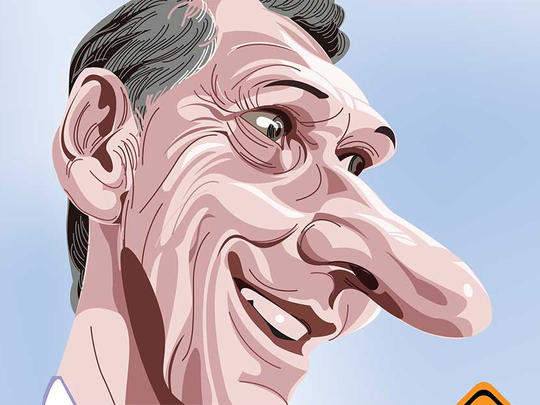
When he was just 32, the president-elect of Argentina, Mauricio Macri, thought his life would follow the predictable pattern of the son of an industrial tycoon, marked by luxury and privilege as he followed his father’s path into business inside the cocoon of this nation’s elite.
But then rogue police officers kidnapped him and placed him in a coffin on their way to a hide-out.
“When they opened the coffin, I breathed deeply as much as I could,” Macri said of the harrowing episode in 1991, which ended more than 10 days later when his Italian-born father Franco Macri paid a multimillion-dollar ransom to secure his release. “I wasn’t sure of anything anymore, not even if I would live through the day.”
Likening the experience to surviving a terminal illness, Macri, now 56, credits the kidnapping with an awakening, putting him on a course that would ultimately lead him to politics.
He eventually became the mayor of Buenos Aires, and last Sunday, he defied early expectations by winning Argentina’s presidential race, upending the nation by defeating the Peronists, who have dominated politics there for decades.
Only a day later, Macri moved quickly to strike a different tone from that of the departing president, Cristina Fernandez de Kirchner, who — along with her late husband, Nestor Kirchner — had controlled the presidency for the last 12 years.
At a news conference on Monday, Macri emphasised how his administration would differ from that of Fernandez’s on foreign policy. He announced an effort to get Venezuela — a close ally of Argentina under Nestor and Cristina — suspended from the Mercosur regional trade bloc over claims of the infringement of civil liberties there.
And he made clear his desire to revoke an agreement struck under Kirchner with Iran to jointly investigate the 1994 bombing there of a Jewish centre, which killed 85 people. Some investigators have accused senior Iranian officials, including a former Iranian president, of planning and financing the attack, making the agreement to give Iran a direct role in the investigation a political lightning rod.
Macri has also announced plans to improve diplomatic ties with the United States, which became strained in recent years over Argentina’s international debts and Washington’s sway in the hemisphere.
“There is little doubt that Argentina’s relations with the US under a Macri administration will become friendlier,” said Michael Shifter, president of the Inter-American Dialogue, a policy group in Washington.
Cristina stepped down because of term limits, but her divisive governing style had enraged many voters, one of the factors that appeared to hurt her party’s candidate, Daniel Scioli, a former speedboat racer.
After winning by a narrow margin, Macri vowed to “build bridges” with rivals in an effort to achieve a more conciliatory leadership approach.
For one of his most pressing challenges, overhauling a sluggish economy, Macri said he would form a six-member economic Cabinet to unwind currency controls and reduce export tariffs.
Before entering politics with the formation of a centre-right party in 2003, Macri cut his teeth in the cutthroat world of Argentine football. After his kidnapping, he remained for a few years in leadership roles in the construction and auto manufacturing business empire assembled by his father, before winning an election as the president of Boca Juniors, one of Argentina’s most popular football teams. The team, which allows fans who pay for membership to vote for a president every four years, was mired in financial trouble when he took over in 1995. But he pressured the leadership to reduce the team’s debts and start promoting promising younger players.
“At Boca, it didn’t go well at first,” said Orlando Salvestrini, 67, a businessman who met Macri when the president-elect was an 18-year-old summer office worker in his father Franco’s holding company. Later, Salvestrini went on to accompany Mauricio during his 12-year tenure at Boca Juniors, chiefly occupying the post of the team’s treasurer.
“But he kept on going and saw the fruits of his labour,” Salvestrini added, emphasising Macri’s preference for working in teams and mediating between quarrelling parties. For instance, Macri settled one high-profile conflict that arose before an Intercontinental Cup final in Japan, in 2000, when two star players argued over which team member should be selected in a crucial position.
“He was the arbiter and it translated into one of the team’s most famous triumphs,” Salvestrini said of the eventual victory over Spain’s Real Madrid during one of the most glory-laden periods of Boca Juniors, setting the stage for Macri’s successful mayoral campaign in 2007. “Boca helped him mature and grow as a manager.”
While presiding over Boca Juniors gave Macri a chance to establish his own name, he still has to contend with claims that his privileged upbringing makes him unaware of the challenges faced by ordinary Argentines. At a televised debate with Scioli, critics accused him of dismissively smirking at his opponent.
“It provokes fear when you see Mauricio Macri expressing himself quite so arrogantly,” Maurice Closs, the Governor of Misiones province and an opponent of Macri, said in an interview.
Macri has sought to soften his image by explaining that he plans to maintain popular anti-poverty programmes introduced by the Kirchners since 2003. In his personal life, Macri also mixes in exclusive circles, driving perceptions of him as out of touch with some voters.
“I don’t like Macri at all,” said Guadalupe Berlanga, 33, an English teacher in Buenos Aires. “Privileges should not be for just a chosen few,” she said, saying she feared a wave of privatisations. “Macri voters don’t understand the reality because they come from money.”
— New York Times News Service










